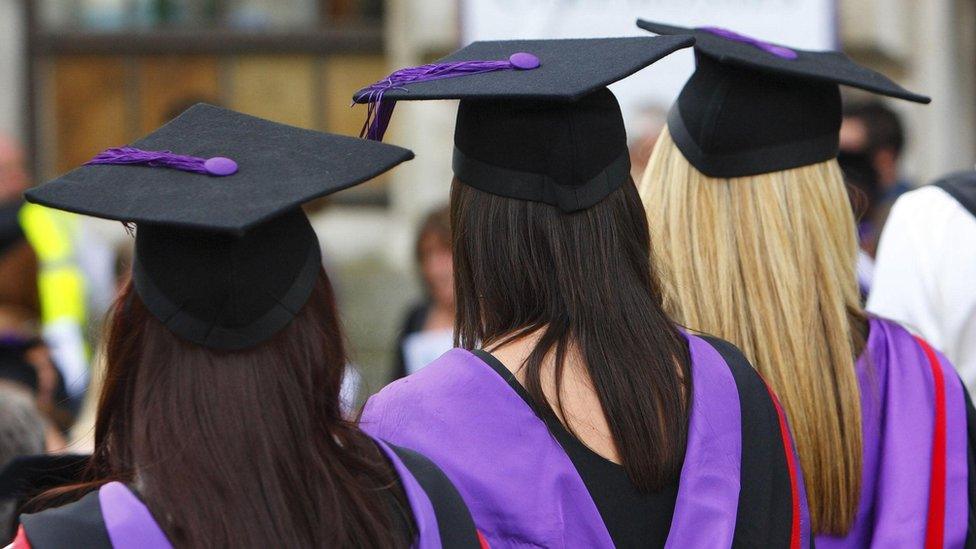'No decision' on post-Brexit EU student fees, says minister
- Published
- comments

No decision has been made about whether to charge EU students more to study at English universities after Brexit, the government has insisted.
They currently pay the same as those from the UK, but it has been reported fees could rise from 2021.
Labour's Angela Rayner accused the government of "building walls" between top British universities and the EU.
Lib Dem Tom Brake said the EU would likely reciprocate, meaning only the richest from the UK could study abroad.
And the EU's Brexit coordinator, Guy Verhofstadt, wrote to the prime minister to warn against the move.
In his letter, he said the "unique and close nature" of the UK and EU's education programmes had been a "major driver for academic excellence" and "undermining it... would deprive our younger generations".
Allow X content?
This article contains content provided by X. We ask for your permission before anything is loaded, as they may be using cookies and other technologies. You may want to read X’s cookie policy, external and privacy policy, external before accepting. To view this content choose ‘accept and continue’.

Buzzfeed reported on Saturday that, external Education Secretary Damian Hinds is proposing to remove so-callled "home fee status" and financial support from EU citizens as of the start of the academic year in 2021.
Tuition fees for international students vary, with undergraduates paying between £10,000 and £38,000 per year.
During an urgent question in the Commons from shadow education secretary Ms Rayner, Education Minister Chris Skidmore did not rule out a fees rise, but said a decision had not yet been taken.
Discussions, he said, were "ongoing and should remain confidential"- the leak to Buzzfeed was "deeply regrettable".
The minister said the government had guaranteed "lifetime funding" for joint education projects between the EU and the UK - such as Erasmus and Horizon - because it recognised the "vitally important contribution" of EU students and staff to the UK's university sector.
However, he said the government wanted to ensure that "we, as a country and as a nation, are attractive internationally" as a destination for study, not just to the EU.
"Does (Ms Rayner) believe that somehow we should offer a student finance package to European students once we have left the EU? Is it right then that we discriminate against Indian students, Chinese students?"
Earlier this year, Mr Hinds promised EU students could still have home fee status if they were starting courses in 2019, and on Monday, he said a decision about 2020 would be made "shortly".
But BBC education correspondent Sean Coughlan suggested universities would be "grinding their teeth" about the ongoing uncertainty about funding.
Allow X content?
This article contains content provided by X. We ask for your permission before anything is loaded, as they may be using cookies and other technologies. You may want to read X’s cookie policy, external and privacy policy, external before accepting. To view this content choose ‘accept and continue’.
Ms Rayner said the government had "time and time again... undermined our universities by their shambolic handling of Brexit".
She added: "It is not in our interest to build walls between our world class universities and our nearest neighbours, yet this government is committed to doing exactly that."
The SNP - which has pledged to keep home fee status for EU students until at least 2020 - said fees could be as high as £25,000 if the new government measures are agreed, with the party's higher education spokeswoman Carol Monaghan criticising the UK's "hostile immigration environment" and "harsh conditions" for current international students.
Labour's Wes Streeting - a former president of the National Union of Students - accused the government of planning to treat EU students as "cash cows".
Mr Skidmore said issues around fees were for future negotiations with the EU, and called on Parliament to back Theresa May's Brexit plan so that next stage could take place.